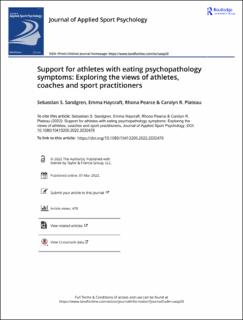| dc.contributor.author | Sandgren, Sebastian S | |
| dc.contributor.author | Haycraft, Emma | |
| dc.contributor.author | Pearce, Rhona | |
| dc.contributor.author | Plateau, Carolyn R | |
| dc.date.accessioned | 2023-01-26T12:06:53Z | |
| dc.date.available | 2023-01-26T12:06:53Z | |
| dc.date.created | 2022-03-02T09:03:43Z | |
| dc.date.issued | 2022 | |
| dc.identifier.citation | Sandgren, S. S., Haycraft, E., Pearce, R., & Plateau, C. R. (2022). Support for athletes with eating psychopathology symptoms: Exploring the views of athletes, coaches and sport practitioners. Journal of Applied Sport Psychology, 1-23. | en_US |
| dc.identifier.issn | 1041-3200 | |
| dc.identifier.uri | https://hdl.handle.net/11250/3046598 | |
| dc.description.abstract | Eating psychopathology is prevalent among athletes yet little is known about how to effectively support athletes with eating difficulties. This study aimed to understand athletes’ and sport professionals’ experiences of, and perspectives toward, supporting athletes with eating psychopathology. Forty-five participants took part in the study and data were collected using two methods: (a) individual interviews were held with athletes with current or previous eating psychopathology symptoms (n = 13); and (b) six focus groups were conducted: two with athletes with no history of eating psychopathology (n = 13), two with coaches (n = 7), and two with sport practitioners (n = 12). The data were analyzed using thematic analysis and two overarching themes were identified. Theme 1 (Tensions around addressing eating psychopathology in athletes) highlighted challenges with communication, conflicting perceptions around the responsibility of addressing and intervening with athlete eating concerns, and difficulties with obtaining relevant and timely support for athletes. Theme 2 (Considerations for developing practical tools to support athletes with eating psychopathology) highlighted a desire for future resources to consider confidentiality, to preserve athletes’ identities and facilitate independence where the athlete is in control of the degree and pace of engagement. In conclusion, tensions exist between athletes and sport professionals which make addressing eating psychopathology in athletes difficult. There is a need to develop accessible, confidential and tailored practical support resources which athletes can engage with independently to support them in the early stages of an eating problem. | en_US |
| dc.language.iso | eng | en_US |
| dc.publisher | Taylor & Francis | en_US |
| dc.rights | Navngivelse 4.0 Internasjonal | * |
| dc.rights.uri | http://creativecommons.org/licenses/by/4.0/deed.no | * |
| dc.title | Support for athletes with eating psychopathology symptoms: Exploring the views of athletes, coaches and sport practitioners | en_US |
| dc.title.alternative | Support for athletes with eating psychopathology symptoms: Exploring the views of athletes, coaches and sport practitioners | en_US |
| dc.type | Peer reviewed | en_US |
| dc.type | Journal article | en_US |
| dc.description.version | publishedVersion | en_US |
| dc.rights.holder | The author | en_US |
| dc.subject.nsi | VDP::Samfunnsvitenskap: 200 | en_US |
| dc.source.journal | Journal of Applied Sport Psychology | en_US |
| dc.identifier.doi | 10.1080/10413200.2022.2032476 | |
| dc.identifier.cristin | 2006876 | |
| cristin.ispublished | true | |
| cristin.fulltext | original | |
| cristin.qualitycode | 1 | |

